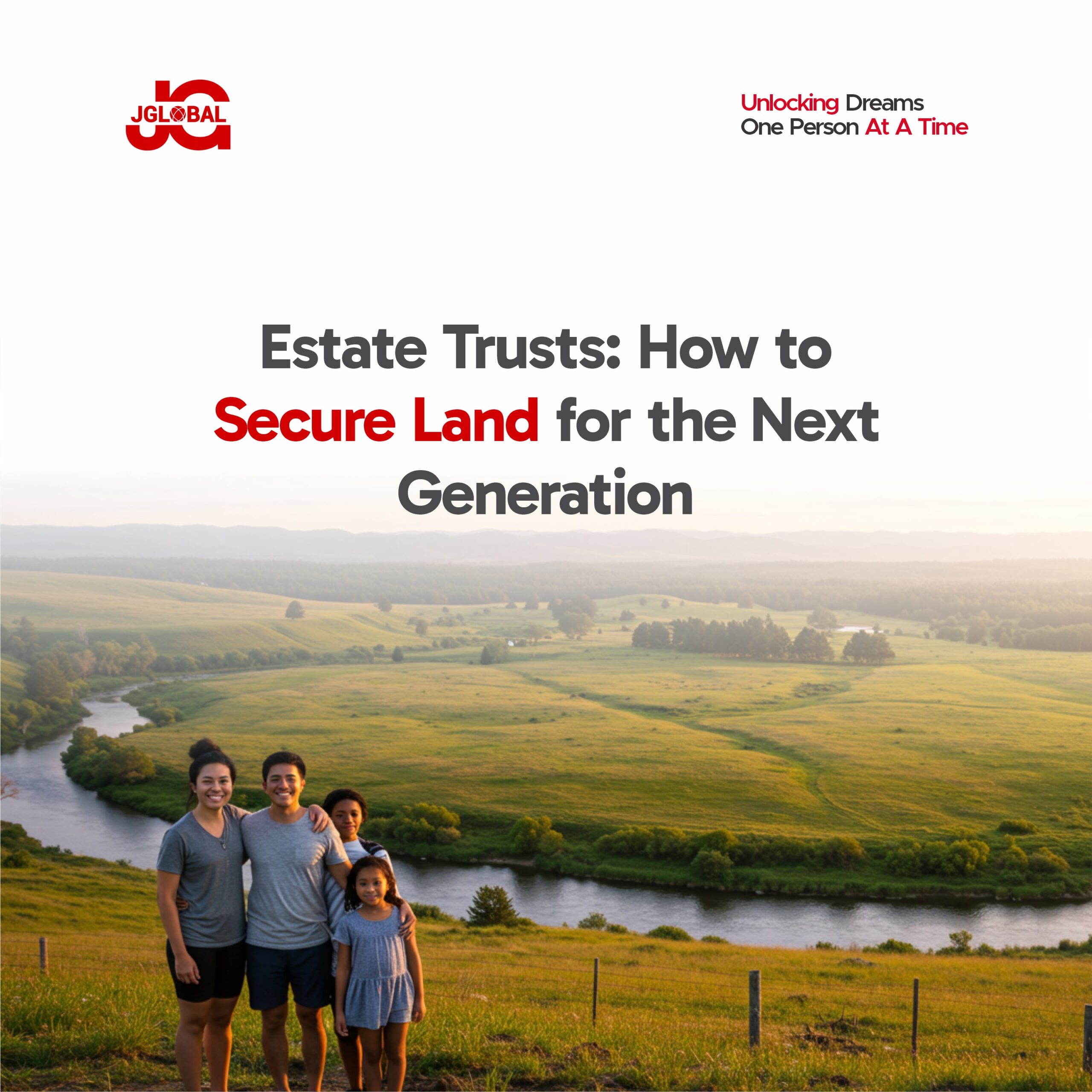Estate Trusts: How to Secure Land for the Next Generation

Introduction
Land is more than just property; it’s one of the most reliable ways to build and transfer wealth. But here’s the big question many families face: how do you make sure your land/property remains in safe hands long after you’re gone? That’s where estate trust in Nigeria comes in.
An estate trust is a structured way to protect your land and pass it down without the common disputes, delays, or risks that happens. If you’re thinking about how to secure land for the next generation, an estate trust could be the most effective path.
In this post, we’ll break down what an estate trust really means, the different types available, the step-by-step process to set one up, key things to consider, and even the alternatives you can explore.
By the end, you’ll see why securing land with an estate trust isn’t just about property, it’s about creating lasting peace of mind for your family.
What Is an Estate Trust?
An estate trust is a legal arrangement where an individual (the settlor) transfers ownership of land or other assets to a trustee who manages the asset on behalf of beneficiaries, usually family members. This transfer is governed by a trust deed, ensuring the asset is preserved and used according to the settlor’s instructions.
It is basically a safe box for your land and property. Instead of keeping them in your name directly, you hand them over to someone called a trustee (this could be a lawyer, bank, or trusted person) to manage on your behalf. The trustee doesn’t own the land; they’re just keeping it safe and making sure it’s used the way you want for the people you’ve chosen (your beneficiaries).
Types of Estate Trusts
If you’re thinking about how to secure land for the next generation, you’ll likely come across a few common types of estate trusts in Nigeria:
- Private Trusts: This is the most common one for families. Here, a trustee holds land or property privately for specific people you name as beneficiaries (like your children).
- Living Trusts (also called Inter Vivos Trusts): You set this up while you’re still alive. The good thing is, you can adjust or update it if situations change.
- Testamentary Trusts: This one kicks in only after you’ve passed away. It’s usually created through your will, so the trustee manages your land exactly as you instructed.
- Revocable vs. Irrevocable Trusts:
- Revocable Trusts: You can change your mind, update, or even cancel them while you’re alive.
- Irrevocable Trusts: Once created, you can’t easily change them. But they offer stronger protection and sometimes tax benefits.
- Revocable Trusts: You can change your mind, update, or even cancel them while you’re alive.
- Dynasty Trusts: These are long-term. They’re built to protect land and wealth across many generations (your kids, their kids, and even beyond).
How to Set Up an Estate Trust to Secure Land
Now that you know the types of trusts, how do you actually set one up to protect your land for the future?
Here’s a simple breakdown:
- Decide What You Want to Protect: Start by listing the land or property you want to secure for your children or family. This helps you know exactly what the trust will cover.
- Choose Your Beneficiaries: Be clear about who should benefit from the land. It could be your children, spouse, or even extended family. The clearer you are, the fewer problems later.
- Pick a Trustee You Can Rely On: This is very important. The trustee is the person (or institution) who will manage the land for your beneficiaries. Pick someone honest, dependable, and preferably with legal or financial knowledge.
- Work with a Legal Professional: Setting up an estate trust in Nigeria requires proper documentation. A lawyer will help you draft the trust deed so it is valid under Nigerian law.
- Register the Trust Properly: Once drafted, your trust needs to be registered and recognized by the authorities. This is how to make sure it stands legally, so no one can challenge it later.
- Plan for the Future: Think about what happens if situations change. For example: What if one of your beneficiaries is still a minor? What if a trustee can no longer serve? These details should be included in your trust.
- Review and Update if Needed: Life changes. Maybe you buy more land, or your family grows. Reviewing your trust from time to time keeps it updated and relevant.
Considerations Before Setting Up an Estate Trust
- Cost and Complexity: Trust setup can be more expensive and insightful than writing a will, and requires careful drafting.
- Control vs Protection:
- Revocable trusts offer flexibility but less protection.
- Irrevocable trusts are restrictive but offer asset protection and tax advantages.
- Revocable trusts offer flexibility but less protection.
- Legal & Tax Implications in Nigeria
Trusts can avoid probate and offer tax planning opportunities.
Alternatives to Estate Trust in Nigeria
When people think about how to secure land for the next generation, an estate trust is a strong option, but it’s not the only one.
Here are a few other ways people in Nigeria pass land to their family:
- Wills: A will is a legal document where you state who should inherit your land after your death. It’s easier and cheaper to prepare than a trust.
However, it must go through a legal process called probate before your family can access the land. Probate can take time, cost money, and sometimes cause disputes among family members. - Joint Ownership (Right of Survivorship)
This simply means owning land with another person (like a spouse or sibling). If one owner dies, the land automatically passes to the surviving owner without going through probate.
The downside is that it only works smoothly if there’s trust between co-owners, and it doesn’t give you much flexibility for future generations. - Deed of Gift
This is when you legally transfer land to someone else as a gift while you are still alive. It’s instant and straightforward.
But it has limits: once transferred, you no longer have control over the land. It can also be challenged in court if other family members feel cheated.
Also Read: Will Vs. Deed of Gift
FAQs
Q1: Can I change or revoke a trust?
Yes, only if it’s a revocable trust. Irrevocable trusts cannot be altered once set.
Q2: Is trust better than a will for safeguarding land?
A trust generally provides faster access for beneficiaries, avoids probate, and offers more legal protection than a will.
Q3: Who should be a trustee?
Choose someone trustworthy, capable of managing assets, like a lawyer or a reputable firm, if not a reliable family member.
Q4: Can trusts reduce taxes in Nigeria?
They can help manage tax obligations by avoiding probate and helping structure income distribution consult a tax advisor.
Conclusion
If you’re serious about how to secure land for the next generation in Nigeria, an estate trust is more than a legal instrument; it’s a long-term wealth safeguard.
By choosing the right type of trust and setting it up carefully, you can pass down land with little fuss, ensuring your family benefits for decades



